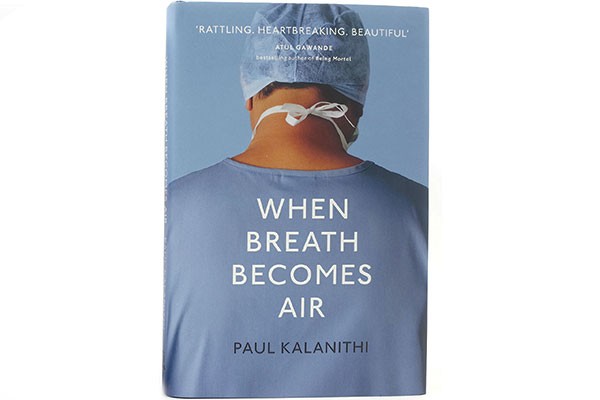I might be biased when it comes to reviewing When Breath Becomes Air: my degrees in Neuroscience and English are the same as Paul Kalanithi’s, his favourite books are my favourite books, his fascination with identity matches mine, and his notions of mortality, while far more informed, are still very similar to mine. The first difference between us is that Paul is both a Stanford trained Neurosurgeon and a hugely successful author, while I am neither. Paul only wrote one book, When Breath Becomes Air, which brings up the largest difference: I am still alive. I need to add a disclaimer / side note / what have you, that I mention his death not out of crassness, but with the deepest respect and empathy.
In the saddest and loveliest way, it is Paul’s death that makes this book brilliant. When Breath Becomes Air is Paul’s memoir, written as he struggles with stage IV metastasised lung cancer. Paul writes about how we face our own mortality, and ultimately how this affects who we try to be. Paul reflects that: “Science may provide the most useful way to organise empirical, reproducible data, but its power to do so is predicated on its inability to grasp the most central aspects of human life: hope, fear, love, hate, beauty, envy, honour, weakness, striving, suffering, virtue.”
Paul highlights what we all struggle with: reconciling the ugly fact of death with the simple art of dying. “I began to realize that coming in such close contact with my own mortality had changed both nothing and everything. Before my cancer was diagnosed, I knew that someday I would die, but I didn’t know when. After the diagnosis, I knew that someday I would die, but I didn’t know when. But now I knew it acutely. The problem wasn’t really a scientific one. The fact of death is unsettling. Yet there is no other way to live.”
The wrench really begins to jar in your heart when Paul and his wife Lucy, despite Paul’s diagnosis, decide to have a child. Their kid Cady is born, Paul’s condition continues to worsen, and then the story stops. What smacks you in the kidney the most is not the sudden absence of Paul’s kind voice, or the reality that death could take you at any time, what really crushes the humanity you thought you didn’t have into some lemony tears is the grace with which Paul continues to live. You may feel like I have spoiled everything for you just now, I haven’t. If you read cover to cover, these details are the first to be disclosed. What is left for you to discover is who Paul was. They say that it is impossible to be immortal; to live forever, to be perfectly preserved, but Paul may have achieved it.
So, if you want a book that you have to read in a day, read this one. If you want a book that will remind you what you are doing here, read this one. If you are questioning the importance of encouraging students to take arts degrees, read this book. If you are feeling lonely, read this book. If you think you have been found, read this book. Read this book.



